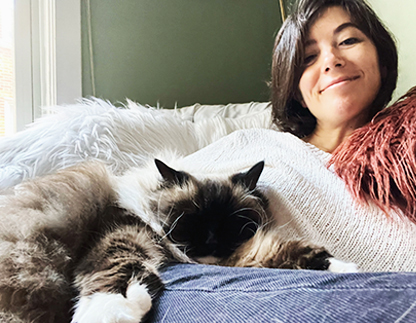My work comes out of archival research that focuses on first-hand accounts of musical and aural phantoms.”
Olivia Cacchione (she/her)
PhD Candidate in the Department of Musicology

Olivia Cacchione is a PhD candidate in the Department of Musicology in the Bienen School of Music. Her current work deals broadly with intersections of music, sound, and spirit in the long nineteenth century in England and America. Olivia’s dissertation examines the cultural history of hearing, questioning how music haunts us, with an emphasis on the lived experience of Victorian-era spiritualist séance.
How would you describe your research and/or work to a non-academic audience?
My work deals with music and sound in relation to the history of ghosts in England and America. I study the intimate link between hearing and haunting—the poltergeist rapping in the walls, the spirit creaking on the steps, and, especially, the use of music in nineteenth-century spiritualist séances in which musical instruments would frequently fly around dim parlors playing songs from unseen hands. I’m particularly interested in the lived experience of haunting from the perspective of those who were profoundly enchanted by these events. My work comes out of archival research that focuses on first-hand accounts of musical and aural phantoms.
What have been some of the most memorable twists and turns of your career?
I’m a harpist and I started my graduate career with an MM in performance at the University of Washington and then began a DMA. Throughout those years, I was also taking exciting music history courses that made me realize the field was so much broader than I previously thought. I found myself always wanting to study instead of practice and realized I needed to change directions.
Tell us what inspired your research and/or work.
During my first term at Northwestern, I was taking a music historiography class that involved looking for traces of music and sound in the library’s special collections. I found a letter in the Death Collection written in 1861 from a girl to her friend describing a séance with a “musical medium.” I've always been obsessed with ghost stories, so from then on, I couldn’t put the topic down.
How do you unwind after a long day?
I'll either hang out with my cat, Madame Blavatsky, and watch some guilty-pleasure television or spend time with friends.
What books are on your bedside table?
The Searcher by Tana French and The Tokyo Zodiac Murders by Soji Shimada—I am a lifelong murder mystery devotee.
What did you originally want to be when you grew up?
I wanted to be a writer and an archaeologist—I tried writing my first novel when I was 13—and I dreamed of a life spent traveling the world and digging in the dirt. After an archaeological field school in Alaska one summer in college, I decided that I loved the dirt as much as I thought I would, but the theory side wasn’t for me. But I see myself as having achieved these goals in many ways as I sift through archives and draw out their stories.
What advice would you give your younger self or someone considering a similar path?
My academic career changed dramatically when I realized that I had something to say. At that point, I finally quit trying to say what I thought was expected of me and started trying to make people care about my actual (sometimes quirky) ideas. I would encourage my younger self and anyone else starting out in the humanities to listen to that voice.
Tell us about a current achievement or something you're working on that excites you.
I recently wrote an article on a guy who built a motor in 19th-century Philadelphia that he said was powered by music and was a portal to the spirit world. It was the most fun thing I’ve ever researched and written in my life.
What are you most proud of in your career to date?
A few years ago, I received a Mellon Fellowship from the Council of Library and Information Resources based out of the Library of Congress to conduct a year’s worth of archival research for my dissertation. It was incredibly validating to have my work recognized by an organization I admired so much.
Published: December 13, 2022
If you know a graduate student, postdoctoral trainee, graduate faculty member, staff member, or a member of our TGS alumni population who would make a great candidate for our TGS Spotlight Series, please complete this brief TGS Spotlight Series Nomination Form.